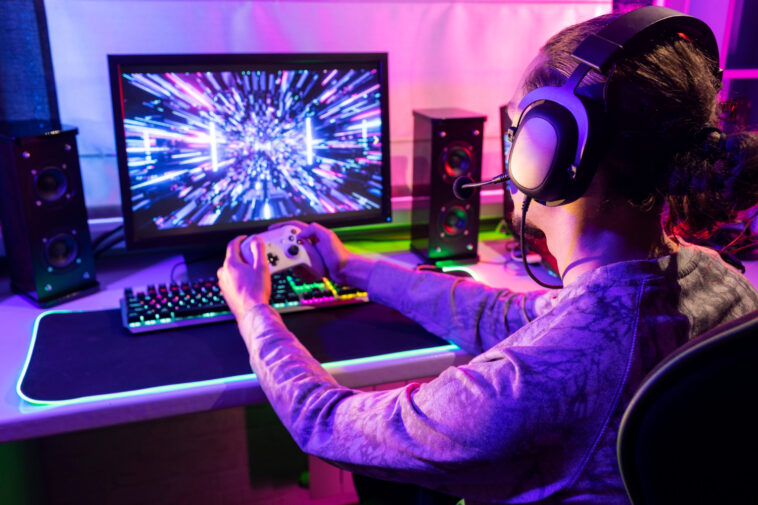Gaming PCs provide the ideal setup for playing classics like Doom and Quake or upgrading modern titles with maximum graphics settings, providing greater upgradability as you need upgrades or expansions in the future.
Make sure your gaming PC has an effective cooling system as gaming PCs tend to produce more heat than standard computers and this can damage components if left unchecked.
What is a gaming pc?
Gaming PCs are personal computers specifically designed for playing video games, often equipped with high-end graphics cards, fast processors, ample memory storage capacity and multiple monitor support for an immersive gaming experience. Gaming PCs can either be custom built or prebuilt.
Gaming PCs can be used for more than just gaming – from work or school to providing the ultimate user experience with peripherals designed specifically to make using them more comfortable. Furthermore, in addition to gaming these machines can also be utilized for photo or video editing, web browsing and general computing tasks.
Gaming computers can be constructed with any number of components, but the primary element for optimal gaming performance is usually its graphics card. A powerful graphics card should support high resolutions and features while handling high frame rates efficiently.
Gaming PCs can be costly, but they’re an excellent way for gamers to experience an immersive gaming experience. Gaming PCs also allow people to stay current with technology trends by investing in top-of-the-line components; plus they’re more customizable than regular PCs and can even be upgraded over time.
Performance
Gaming PC performance is determined by its graphics card and processor, which are essential for playing modern games at high resolutions and frame rates. Gaming PCs usually also boast fast RAM storage for quicker game loading times.
When purchasing a gaming PC, look for models featuring Intel or AMD CPUs and GPUs. Central Processing Units (CPUs), also known as processors or CPUs, interpret and execute code running on your screen; more cores equal more power available for this task.
Gaming PCs often include cooling systems to handle high temperatures and prevent thermal throttling – when components slow down in response to excessive heat – in order to protect themselves from damage from overheating. Though more costly than standard air-cooling solutions, such systems can enhance gaming experiences by shortening load times and increasing frame rates.
Many gaming PCs feature SSD storage, enabling faster file reading. You can purchase an SSD separately but having one included will significantly enhance performance of your system. Gaming PCs should also feature more expansion slots and be easily upgradeable than regular PCs so that new components can be added over time.
Design
Gaming PCs are designed to be upgraded over time with additional components, and typically come equipped with multiple expansion slots to accommodate new graphics cards, processors, or any other high-performance hardware upgrades. Some models even come equipped with liquid cooling systems to remove excess heat from components and prevent thermal throttling – an issue where excessive temperatures cause components to slow down for safety reasons – from happening.
Gaming computers typically utilize faster RAM sticks than regular computers, which can greatly enhance system performance. They may also support monitors with higher refresh rate and resolution to provide a smoother gaming experience when playing fast-paced titles.
Liquid cooling is especially essential in gaming PCs as their premium-grade components generate more heat than usual computers. Without an adequate cooling system in place, these components could overheat and become damaged; for this reason, most gaming PCs come equipped with or contain room for liquid cooling systems – as liquid coolers can more effectively remove heat than air-cooling systems and help avoid thermal throttling.
Budget
An effective gaming PC needs a budget that can handle the latest games. While regular computers may run office software and allow basic photo or video editing, gaming PCs require dedicated hardware designed to run high resolution titles at optimal image quality resolutions.
Dependent upon your gaming needs and preferences, you may wish to purchase a gaming monitor, keyboard and mouse as well as a headset. A headset allows teammates to communicate while online multiplayer gaming; gaming keyboards and mice feature enhanced speed with programable buttons as well as ergonomic designs than standard ones.
Gaming PCs should include SSD storage to maximize system speed and reduce game loading times, while most come equipped with a high-quality graphics card for optimal gameplay experience.
GPU (graphics card) is the keystone component of a gaming PC. A high-performing graphics card allows you to enjoy playing the latest titles at high resolutions and frame rates, featuring premium architecture from NVIDIA or AMD that delivers optimal gaming performance. When choosing a prebuilt gaming PC, make sure its configuration includes GPU and CPU components which meet your gaming needs; otherwise you could spend both time and energy shopping separately for them separately.



